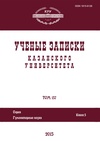Значение доктринального наследия Д.И. Мейера в становлении учения о механизме осуществления гражданских прав и исполнения обязанностей
The Value of D.I. Meyer’s Doctrinal Heritage in the Formation of the Doctrine of the Mechanism of Exercising Civil Rights and Performance of Duties
Author(s): Evgeny Valeryevich Vavilin, Grigorii Vcheslavovich KolodubSubject(s): History of Law, Civil Law, Sociology of Law
Published by: Казанский (Приволжский) федеральный университет
Keywords: D.I. Meyer; civil law; mechanism for exercising rights and duties; guaranteed rights; civil law institution; guardianship and trusteeship; property relations;
Summary/Abstract: This paper is devoted to a brief overview of the scientific heritage of D.I. Meyer, who made an enormous contribution to the formation and development of the modern civil law doctrine and legislation. The ability of a scientist to keenly feel the needs of Russian society in the settlement of certain legal issues is very important. This skill and high professional qualities of D.I. Meyer were reflected in his work “Russian Civil Law”, the provisions of which were implemented in the modern legal norms – in such legal entities as guardianship and trusteeship, as well as property relations. The scientist played a crucial role in the development of modern civil law; his works created at the turn of the 19th – 20th centuries remain relevant to this day, in modern Russian civil legislation, because D.I. Meyer’s findings are the significant achievements that allowed to complete the work on the justification of the implementation mechanism of civil rights and enforcement and the mandatory part of this theory – the concept of guaranteed implementation of civil rights. The characteristic of D.I. Meyer’s scientific activity is that he did not pursue exclusively dogmatic tasks aimed at identifying distinctive features, by means of which it would be possible to delimit the phenomena under study, for example, the ownership right from all other rights of property rights. D.I. Meyer, in his reasoning, clearly drew a line towards binding theory and practice. Another feature that can be considered is the inclusion of the social aspect in the content of subjective civil rights, in particular, determining the social nature of property rights.
Journal: Ученые записки Казанского университета. Серия Гуманитарные науки
- Issue Year: 161/2019
- Issue No: 4
- Page Range: 59-68
- Page Count: 10
- Language: Russian

